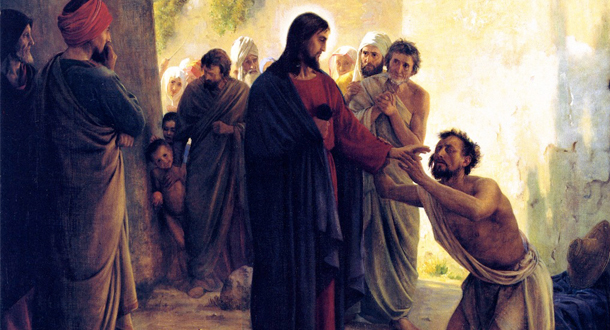
Scripture:
Jeremiah 31:7-9
Hebrews 5:1-6
Mark 10:46-52
Reflection:
In our Gospel reading for this Sunday (Mark 10:46-52), Jesus is leaving Jericho. By the roadside, a man named Bartimaeus is begging. He is blind. When he hears that Jesus is passing by, he cries out, “Jesus, son of David, have pity on me.” When others tell him to be quiet, he just cries out again, “Son of David, have pity on me.” So, as is often the case, Jesus stops. And He tells the others to call Bartimaeus over. When the people tell Bartimaeus to go to Jesus, Mark tells us that “He threw aside his cloak, sprang up, and came to Jesus.” When Jesus asks him what he wants, Bartimaeus says, “Master, I want to see.” Jesus tells him, “Go your way; your faith has saved you.” Bartimaeus receives his sight and proceeds to follow Jesus.
There is much symbolism connected with sight, and this encounter between Jesus and Bartimaeus has so much to teach us. To state the obvious, Bartimaeus cannot help but know he is physically blind. But he has faith enough to see that Jesus can help him. And what he is yearning for is to see.
When it comes to the commandment to love God and to love our neighbor, are we humble enough to recognize that we may be blind with respect to other persons or groups of people, or even to the rest of creation? When I get in my car, I have enough sense and humility to know that I can have blind spots when I’m driving. The car has a rearview mirror, and side mirrors, and in the case of the car I drive, a system that has a light that blinks when there is another vehicle coming up on one side of me or the other. I also have the sense to follow my training, and look to the side and a little behind when I want to change lanes. But can I have enough humility to recognize that I may have a blind spot when it comes to certain people or groups of people? And am I willing to ask God to let me see?
When we have trouble seeing others as God sees them: as those beloved of God, there is blindness there. It can be comfortable to stay in our blindness. We may be more apt to jump to conclusions than to be like Bartimaeus and jump up to be healed of our blindness.
Does this mean we should turn a blind eye, so to speak, to evil and injustice? No, we may have to speak up for what is right and just. We are to work for justice and peace and the common good as our way of helping build up the kingdom, and following the commandment to love. But does that have to involve being blind to the humanity of the “other?” Does it mean we try to take God’s place in condemning others? I don’t believe so.
Bartimaeus reminds us to ask for God’s grace to see clearly; to see others and all of creation as we are meant to see them. Perhaps we can add an intention to our daily prayers: “Master, where I am blind, I want to see.”
Fr. Phil Paxton, C.P., is the local superior of the Passionist Community in Birmingham, Alabama.
